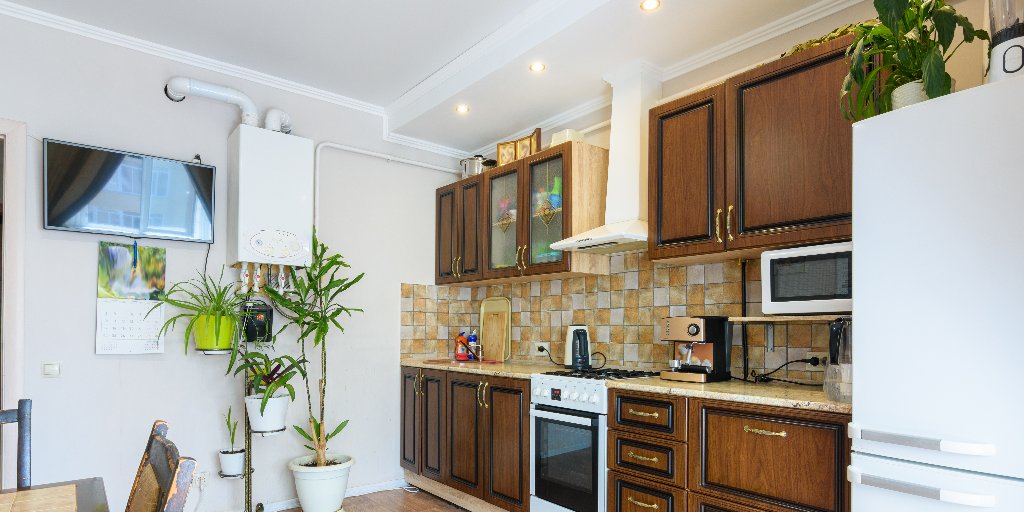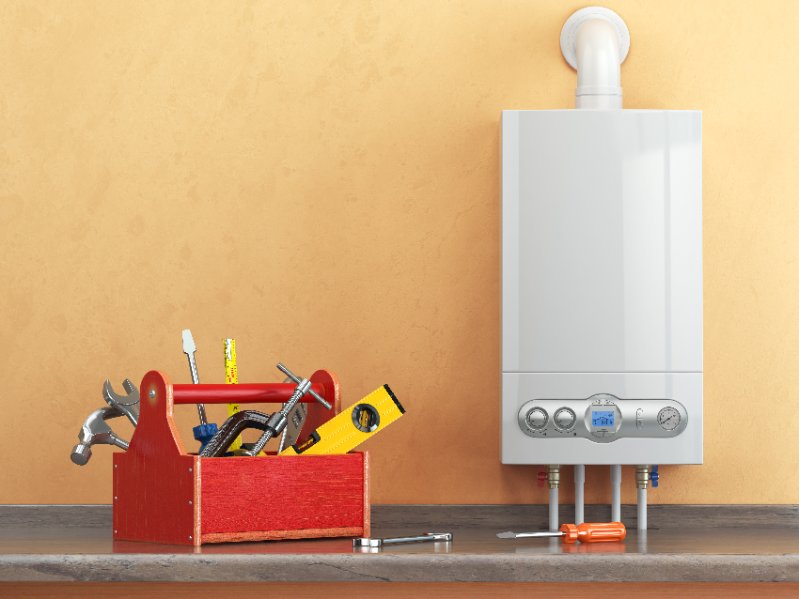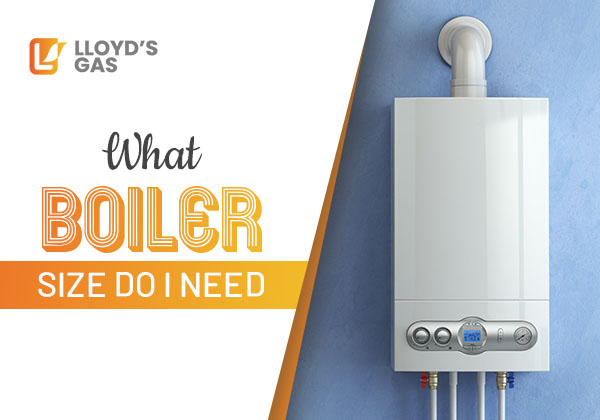Your home needs to be warm if you and your family are going to be comfortable all year round. While there are some other factors, such as the property’s insulation, that’ll determine how cosy your house can be; the main factor will be the boiler that you have. That’ll do all the legwork when it comes to heating your home, and if you don’t have the right one, then you might find that you’re chillier than you’d like to be — or, on the other end of the scale, that you’re paying for heating that you just don’t need.
Given the number of options available, it’s normal that people usually ask, ‘what size boiler do I need?’ The sheer variety of types means that it can be a little overwhelming to sit down and figure out what exactly you need. That’s why we here at Lloyd’s Gas thought it would be a good idea to put together a guide to help you understand what you need. We’ll answer questions that include how many radiators can a boiler run, and guide you through the boiler for 5 bedroom house, boiler for 4 bedroom house, what boiler wattage is, and more.
Why should you trust us? Because we’re the leading boiler installation company in Manchester and have a wealth of knowledge, expertise, and experience to help ensure that you get the best boiler for 3 bedroom house or other. Ready? Let’s dive in.
What size boiler is right for my property?
Not all boilers are the same. While they may all look broadly similar, there can be big differences between their output — or, in other words, big differences between their suitability for a particular property. You could put one boiler in a property, and it would be perfect, but put it in a larger or smaller property, and it could be entirely the wrong option.

So what you’re trying to do is find your “goldilocks boiler.” That is to say, the one that is just right for your property. When you’re trying to answer the question, ‘what size combo boiler do I need’, the first place to start is by looking at the size of the property that you want to heat.
There are a few different ways to calculate which boiler is right for you. One option is to count the number of showers/bathrooms that you have on your property.
If you have one shower, then you’ll be looking at at least 26kW of power from your boiler; if you have two, 30 kW; if you have three, 35kW; if you have more than three, then 35kW of power would be needed. Note that if you’re running multiple bathrooms (3+) all at once, then the question ‘what size combo boiler do I need’ starts to become irrelevant. There’s no combo boiler size that can power more than four showers all at once — at that stage, it’ll be best to look at more traditional boilers.
When doing their own boiler size calculator workings out, people tend to use the number of showers and bathrooms that they have as the basis for the calculation. However, there are other ways. You can look at the number of bedrooms that you have, for instance.
The best combo boiler for a bungalow would have a boiler wattage of around 26kW. A three bedroom house would need a minimum of 29 kW; a four bedroom house would require around 29-35 kW. The best combo boiler for large house would have a boiler wattage of 35kW. If the house is bigger than five bedrooms, then a combo boiler for large house probably wouldn’t be possible. The boiler size and strength wouldn’t be enough.
Why is it important to have the right size boiler
A boiler is not just a boiler. The boiler dimensions and aesthetics are important, of course, because you’ll need to have space for it in your house, and hopefully, it would fit in seamlessly with your overall decor.
However, the most important element is that it provides the right level of power for your house. If you choose the wrong size boiler for your needs, then you could have one of two problems, as outlined below.
Problem One: It Won’t Heat Your Home
The whole point of having a boiler is that you and your family have enough hot water to shower, and that you can power the heating around your house. If your boiler is under strength, then you’ll end up with a lack of heating to your radiators or showers — or, if it’s particularly under strength, then both. That’s not a problem that you want to figure out that you have on a cold January morning. As such, it’s best to get things correct at the first time of asking.
Problem Two: It’s Too Strong
Now, you might think that the idea of having a boiler that’s too capable isn’t so bad. But it is. First of all, you won’t necessarily get any additional advantages from having a boiler that’s stronger. You would get the same strength from a boiler that’s right for you. What you will end up doing is wasting money. First, you’d waste money on the boiler itself. Second, you might waste money on heating costs. Both of these things can result in high costs, which you would likely much rather spend elsewhere!
How to calculate what size boiler your home needs, counting radiators

We discussed earlier how you could calculate which boiler could be right for you by counting your showers/bathrooms or just broadly by looking at the number of bedrooms that the property has. But there’s another way that you can calculate things, too — you could count the number of radiators that you have. This would be a better way of doing things if you only have one bathroom/shower but have a large home. At that point, it’s not the ability of the boiler to provide multiple hot water sources all at once that matters most, but the ability of the boiler to heat multiple rooms.
As a rough outline, you can use the following estimates for the amount of power you’ll need your boiler to have depending on the number of radiators that you have on your property.
- If you have up to ten radiators, you’ll need your boiler to have 24 – 27 KW
- If you have between ten and fifteen radiators, you’ll need your boiler to have 28 – 34 kW
- If you have fifteen to twenty radiators, you’ll need your boiler to have 32 – 40 kW.
That’s the guidelines if you’re going for a combi boiler. If you’re after a system or heat only boiler, then the following guidelines should be followed:
- If you have up to ten radiators, you’ll need your boiler to have 22 – 15 KW
- If you have between ten and fifteen radiators, you’ll need your boiler to have 18 – 24 kW
- If you have fifteen to twenty radiators, you’ll need your boiler to have 30 – 40 kW.
Types of boilers you can choose from
As you might have gathered so far, there’s a lot to know when it comes to boilers. There are different strengths and sizes, of course, but there are also different types of boilers. They don’t all work the same way, for instance. The main three types of boilers are: Combi boilers, system boilers, and heat only boilers. We’ll go through the pros of each and run through which type of boiler is best for each type of property.
Combi boilers
Combi boilers are good because they generate hot water instantly; that’s why they need a bit more power than other models. There’s no waiting around for the water to get hot! It’s generally best for smaller properties as you can only use one hot water tap at once. You’ll need to have the right amount of water pressure to use this type of boiler, too.
System boilers
With system boilers, there’s a large tank that stores the hot water while it’s not in use. It’s not generated instantly, but when it’s hot, you’ll be able to use various different hot taps at once. As with combi boilers, you’ll need to have good water pressure.
Heat only boilers
Heat only boilers work similarly to system boilers, but it works on a gravity system, so you need to have tanks in your loft. It’s best for HMO properties.
Lloyd’s Gas can install any boiler of any size in Manchester!
Finding the right boiler for your house is important, as we’ve seen. Happily, you don’t need to go through the process alone. Here at Lloyd’s Gas, our boiler experts in Manchester will happily help you to figure out what boiler you need. And that’s not all — we’ll also install the boiler and ensure that it’s fully functional, giving you peace of mind that your boiler is working as efficiently as possible. You can call us on 07478 333 457 or click the ‘Get Instant Quote’ button at the top of this page.


